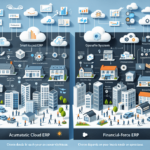Acumatica Cloud ERP vs Microsoft Dynamics 365 Business Central
Choosing the right Enterprise Resource Planning (ERP) software is crucial for enhancing your business's efficiency, productivity, and profitability. Among the top contenders in the market are Acumatica Cloud ERP and Microsoft Dynamics 365 Business Central. This comprehensive comparison delves into their pricing, features, user interface, implementation processes, integration capabilities, customization options, scalability, security features, customer support, and real-world success stories. By the end of this guide, you will be better equipped to determine which ERP solution aligns with your business needs.
Pricing and Licensing
Acumatica Cloud ERP Pricing
Acumatica Cloud ERP offers a flexible subscription-based pricing model, allowing businesses to pay based on the specific resources and modules they require. This modular approach ensures that companies only invest in the functionalities they need, potentially leading to significant cost savings. Additionally, Acumatica provides unlimited user licenses at no extra cost, making it an attractive option for growing teams.
Microsoft Dynamics 365 Business Central Pricing
Microsoft Dynamics 365 Business Central employs a more traditional pricing structure based on user licenses. While this model can offer comprehensive features, it may become costly for organizations with a large number of users. Microsoft also offers different pricing tiers, which include varying levels of functionality, but the per-user cost can accumulate quickly.
According to Gartner's ERP Market Report 2023, flexible pricing models like Acumatica's are increasingly preferred by small to mid-sized businesses seeking scalability without hefty upfront costs.
Key Features and Capabilities
Acumatica Cloud ERP Features
Acumatica Cloud ERP is renowned for its robust financial management, including automated billing, accounts payable, and accounts receivable. It also excels in project accounting with features like budget tracking, project planning, and resource allocation. Additionally, Acumatica offers comprehensive tools for customer management, distribution, and manufacturing, making it suitable for various industries such as retail, manufacturing, and services.
Microsoft Dynamics 365 Business Central Features
Microsoft Dynamics 365 Business Central provides advanced inventory and supply chain management, including demand forecasting, order management, and procurement. Its integration with other Microsoft products like Office 365 and Power BI enhances its functionality, offering seamless data analysis and reporting capabilities. Business Central also supports financial management, project management, and customer relationship management (CRM), catering to businesses across multiple sectors.
Industry analysis from Forrester's ERP Evaluation 2023 highlights that both ERP solutions offer comprehensive features, but Acumatica's flexibility in module selection often provides a more tailored fit for diverse business needs.
User Interface and Usability
Acumatica Cloud ERP User Interface
Acumatica Cloud ERP boasts a modern and intuitive user interface designed for ease of navigation. Its role-based dashboards provide quick access to essential data, enhancing user productivity. The platform allows for significant customization, enabling businesses to tailor the dashboard and workflows to their specific requirements.
Microsoft Dynamics 365 Business Central User Interface
Microsoft Dynamics 365 Business Central features a user-friendly interface that integrates seamlessly with other Microsoft applications. While it offers a familiar environment for users accustomed to Microsoft's ecosystem, some users may experience a learning curve initially. The system also supports customizable views and role-based dashboards, contributing to an efficient user experience.
According to Software Advice's UI Comparison Studies, a clean and customizable interface is a significant factor in ERP adoption and user satisfaction.
Implementation and Integration
Acumatica Cloud ERP Implementation
The implementation of Acumatica Cloud ERP is typically faster, often ranging between 3 to 6 months. Its cloud-based architecture and flexible customization options facilitate a smoother and more efficient setup process. Businesses can quickly adapt the ERP to their workflows without extensive downtime.
Microsoft Dynamics 365 Business Central Implementation
Microsoft Dynamics 365 Business Central generally requires a longer implementation period, ranging from 6 to 12 months. Its comprehensive architecture and extensive customization capabilities necessitate a more detailed setup process, which may involve significant configuration and integration efforts.
Integration Capabilities
Both ERP systems support integration with various third-party applications, including CRM systems, e-commerce platforms, and payroll systems. However, Acumatica Cloud ERP features a more open architecture, facilitating easier integrations with a wider range of applications. In contrast, Microsoft Dynamics 365 Business Central's strong integration with Microsoft products like Office 365 and Power BI offers enhanced functionality within the Microsoft ecosystem.
Research from IDC's ERP Integration Report 2023 emphasizes that seamless integration capabilities are paramount for ERP success, influencing data flow and operational efficiency.
Customization and Scalability
Customization Options
Acumatica Cloud ERP provides extensive customization options, enabling businesses to create unique workflows, fields, and reports tailored to their specific needs. This flexibility ensures that the ERP can adapt to evolving business processes without requiring significant changes to the software itself.
Microsoft Dynamics 365 Business Central also offers substantial customization capabilities, allowing for tailored workflows and reports. However, its customization might be limited by its more complex architecture, potentially requiring specialized expertise for extensive modifications.
Scalability
Both ERP solutions are designed to scale with growing businesses. Acumatica Cloud ERP's open architecture allows for easier scaling and integration with additional third-party applications as business needs expand. Microsoft Dynamics 365 Business Central supports scalability through its robust infrastructure, but scaling may involve more intricate configurations and planning.
According to a study by TechRadar's ERP Scalability Analysis 2023, Acumatica's flexibility often makes it more adaptable for rapid business growth compared to more rigid ERP systems.
Security and Compliance
Acumatica Cloud ERP Security Features
Acumatica Cloud ERP prioritizes security with features such as two-factor authentication, IP restriction, brute force protection, and role-based access control. Additionally, data encryption and comprehensive audit trails ensure that sensitive business information remains secure.
Microsoft Dynamics 365 Business Central Security Features
Microsoft Dynamics 365 Business Central offers robust security measures, including role-based access control, data encryption, and audit logs. While it provides comprehensive security, some advanced features available in Acumatica, such as IP restriction and brute force protection, may not be inherently included.
Industry reports from Cybersecurity ERP Reports 2023 highlight the importance of advanced security features in protecting against modern cyber threats, favoring systems that offer multi-layered security protocols.
Customer Support and Service
Acumatica Cloud ERP Customer Support
Acumatica Cloud ERP distinguishes itself with 24/7 customer support, rapid response times, and personalized onboarding and implementation assistance. Their support includes dedicated account managers and access to a comprehensive knowledge base, ensuring users receive timely and effective help.
Microsoft Dynamics 365 Business Central Customer Support
Microsoft Dynamics 365 Business Central provides reliable customer support through user forums, extensive documentation, and professional support services. However, the level of personalized service may not match the bespoke support offerings of Acumatica.
According to Customer Contact Week's ERP Support Rankings 2023, comprehensive and responsive support services significantly enhance user satisfaction and ERP effectiveness.
Pros and Cons
Acumatica Cloud ERP
- Pros:
- Highly customizable to fit unique business needs
- Seamless integration with a wide range of third-party applications
- Advanced security features ensuring data protection
- Flexible pricing with unlimited user licenses
- Cons:
- May present a steeper learning curve for new users
- Pricing variability based on feature usage can complicate budgeting
Microsoft Dynamics 365 Business Central
- Pros:
- Advanced inventory and supply chain management
- User-friendly interface, especially for Microsoft users
- Comprehensive integration with Microsoft ecosystem
- Predictable pricing structure based on user licenses
- Cons:
- Limited customization options compared to competitors
- Longer implementation timelines
- Higher costs for large user bases
Success Stories
Acumatica Cloud ERP Success
Vuzix Corporation, a leader in wearable technology, implemented Acumatica Cloud ERP to streamline its financial reporting processes. This transition resulted in greater accuracy, faster turnaround times, and enhanced decision-making capabilities, contributing to Vuzix's sustained growth in a competitive market.
Microsoft Dynamics 365 Business Central Success
The Great American Spice Company adopted Microsoft Dynamics 365 Business Central to overhaul its order management processes. The ERP system enabled faster order fulfillment, improved inventory management, and increased customer satisfaction, positioning the company for continued expansion.
Future Outlook
The future of ERP solutions like Acumatica Cloud ERP and Microsoft Dynamics 365 Business Central remains robust, with both platforms continually evolving to meet emerging business needs. Acumatica is expected to maintain its emphasis on flexibility and customization, catering to diverse industries and business models. Meanwhile, Microsoft Dynamics 365 Business Central will likely enhance its integration capabilities within the Microsoft ecosystem, leveraging advancements in artificial intelligence and data analytics to provide deeper insights and automation.
As businesses increasingly prioritize digital transformation, the demand for scalable, secure, and user-friendly ERP solutions will continue to grow. Both Acumatica and Microsoft are well-positioned to adapt to these trends, ensuring their relevance and competitiveness in the ERP market.
In conclusion, selecting between Acumatica Cloud ERP and Microsoft Dynamics 365 Business Central hinges on your organization's specific requirements. Consider factors such as budget flexibility, desired features, customization needs, and integration preferences to make an informed decision that will support your business's long-term success.




















